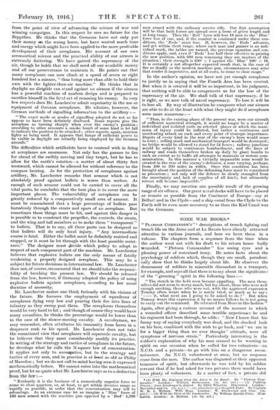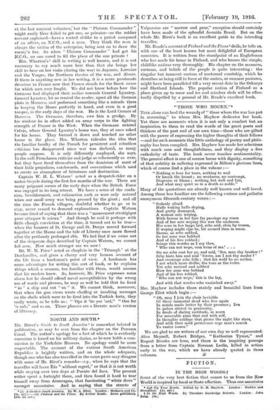SOME WAR BOOKS. * " PLaToolt COMMANDER'S " 3 descriptions of
trench fighting and trench life on the Aisne and at La Bass& have already attracted
attention in various journals, and here we have them in a volume. The chapters form a sequence from the time when
the author went out with his draft to his return home badly wounded. " Platoon Commander " has seeing eyes and a pleasing power of restrained irony. He notes facts about the psychology of soldiers which, though they are small, paradoxi- cally show that he thinks largely about life. He observes the
demeanour of soldiers in miserable discomfort in a transport, for example, and says all that there is to say about the signification of the " grousing " spirit in the following lines :-
" The stench in the hold soon became appalling. The men them- selves did not seem to worry much, but lay about, those who were well enough smoking, those who were not, with the aggrieved expression Tommy often wears when ho is sorely tried, as much as to say : it, what next am I going to be asked to do Y' But when Tommy wears this expression it by no means follows he is not going to carry out the command. He retreated from Mona in this fashion ' Again, after giving a curious account of the manner in which a wounded officer described soma terrible experiews he and his regiment had been through, he adds : " Now I know that his funny way of saying everybody was dead, and the shocked look on his face, combined with the wish to go back, and ' we are in
for a bigger thing than we ever thought' attitude, were all symptoms of nervous strain." Particularly interesting is the
author's explanation of why his men seemed to be wanting in spirit on one occasion when he called for two volunteers—an N.C.O. and a private—to go with him on a dangerous recon- naissance. An N.C.O. volunteered at once, but no response came from the men. The author was disgusted at their apparent tameness of spirit, but afterwards he was told by his soldier servant that if he had asked for two privates there would have
been plenty of volunteers. As a matter of fact, a private did
• (1) With My Regiment from the Aisne to La Base& By " Platoon Com- mander." London : William Heinemann. 13s. 6d. net.l—(2) Fighting France : front Dunkerque to Beijort. By Edith Wharton. Illustrated. London : Macmillan and Co. [5s. net.)—(3) Adventures of a Despatch Rider. By Captain W. H. L. Watson. With Maps. London : W. Blackwood and Sons. 15s. net.)----(4) With the Fleet at the Dardanelles. By William Harold Price. Illus- trated. London : A. Melrose. Da. Cd. net.) at the last moment volunteer, but the " Platoon Commander ". might easily Wave failed to get one, as privates—so the soldier
servant explained—have a rooted dislike to a patrol composed of an officer, an N.C.O., and a man. They think the man is always the victim of the enterprise, being sent on to draw the enemy's fire. So when " Platoon Commander " had got his N.C.O., no one cared to fill the place of the one private !
Mrs. Wharton's s skill in writing is well known, and it is not necessary to say much more here than that she brings her
skill to bear on her visits (during the war) to Argonne, Lorraine and the Vosges, the Northern theatre of the war, and Alsace. If there is anything new in her writing, it is a more passionate devotion to France now that France stands for the finest cause for which men ever fought. We did not know before how the Germans had displayed their malice towards General Lyautey. General Lyautey, let us remind the reader, upset all the German plots in Morocco, and performed something like a miracle there in keeping the Moors perfectly in hand, and even in a good temper, in the early days of the war. He is the Lord Cromer of Morocco. The Germans, therefore, owe him a grudge. By
his wisdom- he in effect added an army corps to the fighting strength of France in the West. When the Germans entered
Crivic, where General Lyautey's home was, they at once asked for his house. They burned it down and touched no other house in the place. Mrs. Wharton ridicules the idea, that the familiar faculty of the French for persistent and relentless criticism has disappeared since war was declared, as many people suppose. It is only differently employed, she says, In the café Frenchmen criticize and judge as vehemently as ever, but they have freed themselves from the dominion of most of their little prejudices, catchwords, and conventions which used to create an atmosphere of bitterness and destruction.
Captain W. H. L. Watson 3 acted as a despatch-rider on a motor-bicycle during the first few months of the war. There are
many poignant scenes of the early days when the British Force was engaged in its long retreat. We have a sense of the confu- sion, bewilderment, and exhaustion such as were only natural when our small army was being pressed by the giant ; and all the time the French villagers, doubtful whether to go or to stay, never ceased to demand explanations. Captain Watson became tired of saying that there was a "mouvernent strategique
pour attaquer le mieux." And though he said it perhaps with little ehough conviction at the time, it turned out to be true—
when the banners of St. George and St. Denys moved forward together at the Marne and the tide of Liberty once more flowed after the perilously prolonged ebb. We feel that if we came out of the desperate days described by Captain Watson, we cannot fail now. How much stronger are we now !
Mr. W. H. Price' acted as chaplain in the ` Triumph' at the Dardanelles, and gives a cheery and very human account of the life from a landsman's point of view. A landsman has some advantages for writing this sort of book, as he explains things which a seaman, too familiar with them, would assume that his readers knew. As, however, Mr. Price expresses some alarm lest he should offend naval susceptibilities by the wrong use of words and phrases, he may as well be told that he lived
in " a ship and not " on " it. We cannot think, moreover, that when the gun crews wrote chaffing or insulting messages on the shells which were to be fired into the Turkish forts, they really wrote, as he tells us : " 'Ope it 'its yer 'ard," " One fer 'is nob," and so on. Those phrases are a literate man's version of illiteracy.



































 Previous page
Previous page